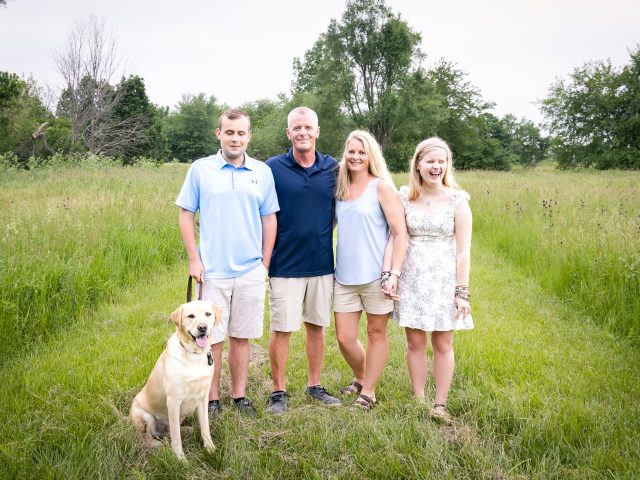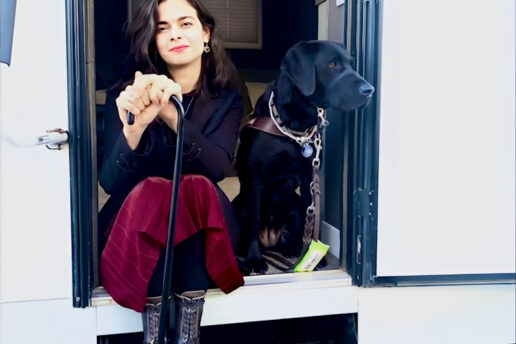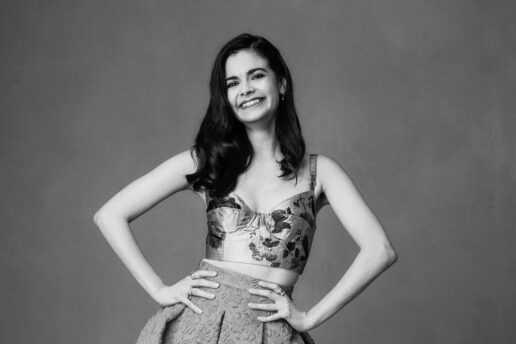
Central Bark Episode 23
Sara Edwards
We're excited to introduce you to Sara Edwards, the mother of two young adults who are part of the GDB community. Both of Sara’s children have attended Camp GDB and her oldest has gone on to receive his first guide dog from GDB. We’ll talk about her experience as a sighted parent raising children who are visually impaired, and how Sara has advocated and championed her children’s journeys along the way.
Today we have a very special episode that's near and dear to my heart. Today we are talking to a mom, an amazing mom of two young adults who are visually impaired, and she's going to share with us a little bit about how our programs at Guide Dogs for the Blind have impacted her children's lives and how she's really learned to be an advocate for her kids. And this means a lot to me because I have to say that my mom was absolutely instrumental in making sure that I succeeded, come hell or high water, so I love talking to moms because they have so much that they've offered their kids. Welcome, Sarah.
Sara Edwards: Thank you. I'm excited to be here.
Theresa: Great. Sarah Edwards is our guest, and she has two young adults who are visually impaired. And that's Ethan and Elisa. Can you tell us a little bit about your children?
Sara: Yes. My husband, Travis and I, we live in central Illinois with our two children, Ethan and Elisa. Ethan just recently turned 20, and he is finishing his second year of college at Illinois State University.
Theresa: Awesome.
Sara: Yes. And Elisa, she is getting ready to graduate high school this spring, and she will be starting college classes in the fall, so she's looking forward to starting that new journey. Both Ethan and Elisa have been diagnosed with Leber's Congenital Amaurosis.
Theresa: No way. That's what I have.
Sara: It's so rare, right?
Theresa: It is, yeah-
Sara: ... so many people, right? They have light perception mostly, maybe some light projection, but they do really well.
Theresa: That's fantastic. Tell me a little bit about how you got involved with Guide Dogs for the Blind and your journey to being part of our community.
Sara: Yes. Ethan, ever since he was very young, has always shown interest in the Guide Dog lifestyle.
Theresa: Cool.
Sara: Yes, very young. He's just always known what he wanted from the get-go. That's just Ethan. But a few years back, a good friend of mine who's actually a teacher for the students with visual impaired students, she works in Arizona. She came across some information about your summer camps at Guide Dogs for the Blind, so she passed this information along and said, "I think Ethan might be interested in these camps." So of course Ethan said, "Absolutely." And so there's no question, we arranged our summer so he could go out to Oregon for the week. He attended two of the summer camps. He attended the summer camps out at Guide Dogs for the Blind in 2018 and 2019.
Theresa: Very cool.
Sara: Yes and then Elisa wanted to try out the Guide Dog for the Blind Camps in the summer. Of course, COVID derailed-
Theresa: Yeah, that was such a bummer, yes.
Sara: ... those plans, so she attended her first GDB Camp was virtual, and then she was able to attend the camp in person last summer, so that was very exciting for her, so she finally got to do that as well. And then over the years, Ethan, he decided to get his guide dog from Guide Dogs for the Blind and of course, COVID derailed that.
Theresa: Man, that COVID.
Sara: Yes. He had gone through all of the training and the interviews and everything, and he was set to go the summer before his senior year in high school. Of course, everything shut down, but he was able to go out in, let me think, April. April of 2021, he was able to go out to Oregon, and he graduated with Ginsburg just a week or two before he graduated from high school.
Theresa: That's fantastic. And tell us about Ginsburg.
Sara: Ginsburg, beautiful, he's very handsome and so smart. What do you say about the guide dogs? It's amazing what these guide dogs are trained to do. It's hard for me as a mom to watch Ethan and Ginsburg work together without tearing up. It really is, it's so nice to see. My husband and I were just talking this morning, we can take Ethan to campus, drop him off, and he just gets out of the car and we can watch from afar, Ginsburg crossing the streets with him, going up to the buildings, finding the classrooms, so it's just wonderful. I love watching that.
Theresa: That is fantastic, yeah, and kudos to you to making sure that he had the training and orientation and mobility to be at the point where he can work so well with a guide dog. Can you tell us a little bit what it's like to be the mom of kids with a visual impairment? It was probably not something you expected when you had kids and what you've learned in terms of getting the services that they need.
Sara: Right. Yeah, 20 years ago when we were told that Ethan had a significant visual impairment, at the time, we didn't know exactly what it was, but we knew he couldn't see, I had no idea what we were in for. I didn't know anyone who was blind. I didn't know any children who were blind. We live in a community, a smaller community outside of a city, and there's no one in our community who's blind, so I really had no idea. And it was devastating. It was scary. But we decided, well, we will do whatever we have to do so that they can be successful in life. We gave them, or we think we gave them every opportunity to try different activities, expose them to different things, whether it was-.
Theresa: So cool.
Sara: ... in the community or in the schools, so that they could decide what they wanted to do or what they liked. If they decided not to do something, it wasn't because they were blind and they couldn't, if they wanted to do something, then we found a way to get them involved and let them do that. So if they didn't do something, it was just simply, it was an activity that they didn't like and they preferred to do something else.
Theresa: I love that. And that took courage, I am sure, from you, when they're little guys and they're like, "I want to ride a bike," or, "I want to do something," that you think, "Oh my God, you might hurt yourself." How did you handle that kind of worry and really be able to balance that with they've got to try?
Sara: Right, so it's funny because I have those fears and I had those fears over the years, but I would be more of the one of, "You can do this and let's do it." Whereas my husband was the one like, "No, they can't cross that street, [inaudible 00:07:56]. I was like, "No they can-
Theresa: Yes, they have to.
Sara: ... we have to step back and we have to let them do it. And we knew that they were going to get bumps. We knew that they were going to get bruises and not every day is great, but we have to try and we have to give them those opportunities.
Theresa: Absolutely, because I really think having those expectations for your kids to do everything, that's really what makes the difference in their lives. They're like, "Oh, well, I can try this," or, "I can try that." You're not putting your own restrictions on what they're able to do, so congratulations for figuring that out. Tell us a little bit about this blog. I heard that you have this amazing blog. Can you tell us a little bit about that?
Sara: Yes. My sister and my kids and I, it's a family effort, have a blog called, Two of a Blind.
Theresa: I love that name, Two of a Blind. That's awesome.
Sara: Yes. That name, actually, my nephew Jared, came up with the name. We were brainstorming one day on vacation, and Jared texted and said, "How about Two of a Blind?" And we said, "Perfect."
Theresa: Love it. I love it.
Sara: My sister, Michelle and I have always talked about ways to bring awareness to others about individuals with visual impairments, and to show people that they can do the same things. They may do things differently, but that's okay. Different is okay, but they still can do things, so we have always tried to come up with ways to brainstorm. We were on vacation last summer talking, and my sister Michelle said, "Let's do a blog." She likes to write, she loves to write, so it's actually her voice behind the blog.
She comes up with topics and ideas that maybe she wants to know more about like, how do they do things in the kitchen or how do they figure out what money they have in their wallet or just whatever it may be, different topics that she may want to know more about or knows that other people ask questions. How do they do this and how do they do that? And then she talks to Ethan and Elisa and they give their perspective on how they go about their daily lives, and then she puts it together and puts it out onto Two of a Blind.
Theresa: That is so cool. I am going to check that out. That just sounds like such a great way to do it. And you're hearing directly from Ethan and Elisa about how they do what they do. And I think it's really great for people to understand that with creative adaptations, you can do anything, so that's great. If you were talking to somebody who maybe has children with vision loss, what would be some tips that you would give them?
Sara: I would start out by saying, you will be okay, and your kids will be okay. If somebody had told me that 20 years ago when I first learned of Ethan and Elisa's vision impairment, I probably would say, "No, I don't believe that." But I would ask parents to believe that you will be okay and your kids will be okay. And just to get them out there, let them try different activities, get them out there. Not even just so that they learn what they can do and that there's no limitations, but also to show everyone else that we can do this and our kids can do this too.
And one thing I would love to see is if we can just close that gap between what people think is normal and what is different because different's okay. If we can just close that gap and show people that individuals with all different kinds of abilities can do this, and that includes our kids too. I would just encourage them to not be scared. One thing has always stuck with me, when my kids started early intervention, and we had the vision specialist in our home, and God bless her, she was in our home for six years.
Theresa: They are amazing, right? Yes.
Sara: And she told me from the very beginning, she said, "Sarah, your children are children first, and they're blind children second." And she said, "You need to treat them as children first." And that really was a pivotal statement for me because it was early on, and I think I was questioning like, "Well, they can't play with this toy because they can't see," or "They can't do this because they're blind," or, "They're never going to college because of this." And I had that mindset because I didn't know.
Theresa: That's right, yep.
Sara: But when she told me, "No, you treat them like children first," and then helped guide me through that, then that really changed how we raised our kids. And so that's what I would encourage all the other parents to do too.
Theresa: That's great advice. And I think so powerful. You're really looking at the individual and not putting a label on someone and putting your expectations on what they're able to do and all that stuff. I just love your passion for this. How do you feel, this is, might be a hard question, but how do you feel you've grown as a person by obviously being a mom?
Sara: Well, many ways, both personally and professionally. I actually went back to school when Elisa turned three and started an early childhood program. I actually went back to school and got my teaching degree to teach students with visual impairments-
Theresa: That's awesome. We need more and more and more of those, yes.
Sara: We do. And my goal, though, was to work in early intervention because I wanted to work with the families. I wanted to work with the families when they were just finding out that their children had a visual impairment. I thought that was really important because I didn't have that, and so if I could do that and help other families. And so I made that change professionally.
Personally, I just think that, and my husband too is, we don't take things for granted. We'll hear friends, we talk about how they're running to this baseball tournament or this wrestling or volleyball, or they're back and forth and they're busy and we're excited for them and we're glad that they get to do that. But we're like, "Hey, don't take it for granted, because we don't get to do that. We don't get to go to those baseball tournaments or watch our kids play," or whatever. We don't take things for granted. We celebrate every milestone and every achievement, however big or small it may be. And I think we're just more accepting. We don't sweat the small stuff.
Theresa: Yeah. And you'll probably live longer for that. That's a really important lesson we could all learn.
Sara: Right, yeah.
Theresa: Oh my goodness. We've got Ethan in college, and you said Elisa's finishing up high school?
Sara: Yes.
Theresa: Oh boy. So is this her last year?
Sara: Yes. So she will graduate in May, and then the plan is to go to a community college starting in the fall. Yeah, so she's excited for that.
Theresa: Oh my gosh. Do they have any ideas of what they might want to do with their future or are they just open to anything?
Sara: Elisa's looking into going to social work.
Theresa: Oh, good.
Sara: Yes. She's a very people person. She likes to talk to people and help them out, so I think it's a good fit for her. And Ethan right now is majoring in journalism because he's always had an interest in broadcasting.
Theresa: Very cool, yeah.
Sara: But he also enjoys IT, he enjoys technology.
Theresa: Good for him.
Sara: Yeah. Where he'll end up, I don't know. He always asks, "Do you think I'll end up in a broadcasting or technology?" I'm like, "I don't know."
Theresa: Or maybe both somehow.
Sara: Maybe both.
Theresa: You just never know. Oh my gosh. Well, Sarah, thank you so much. Thank you and your husband for raising two amazing people. And I look forward to hearing more about what they get up to, so thanks for joining us today.
Sara: Great. Thank you for having me.
Theresa: For more information about Guide Dogs for the Blind, please visit guidedogs.com.
Related Episodes



